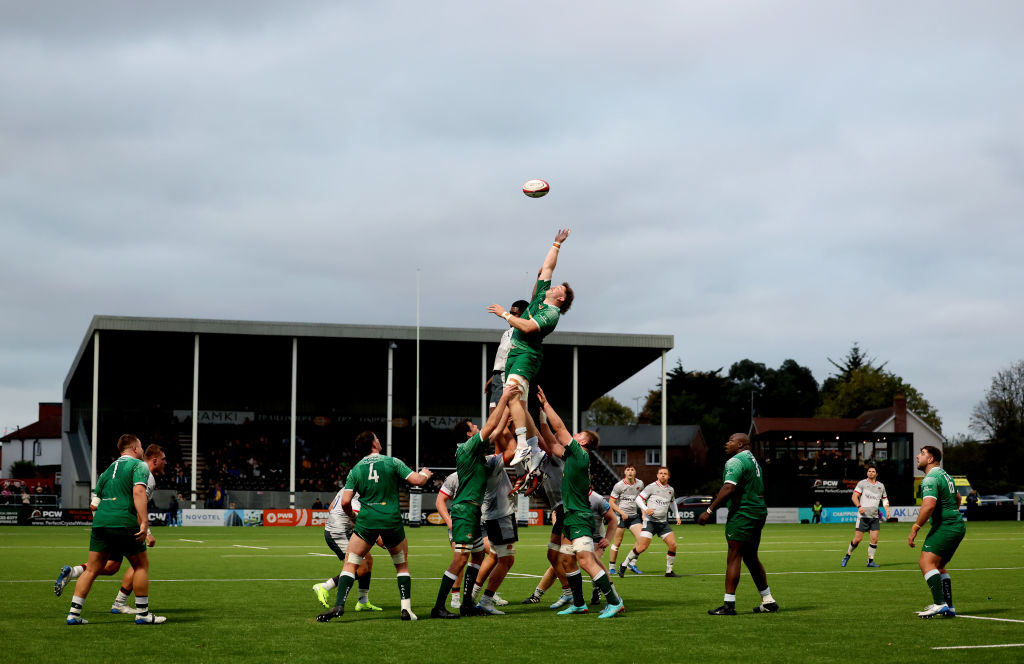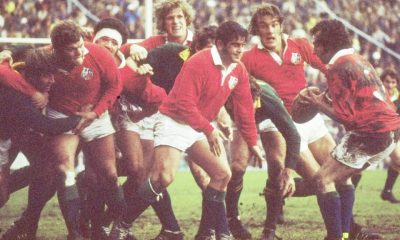
FOR someone like me who watches boxing occasionally, I do it for the attacking boxers. It’s not that I don’t appreciate great defensive boxers and counter-punchers like Floyd Mayweather, but Mohammed Ali was always the main attraction for me.
Ali was all-court. He could attack, defend, and do the smoke and mirrors stuff, but when he was in his prime it was all about his skill and ambition, and especially his desire to have a go in attack.
In many ways Rugby Union is the same, because what has attracted most people to it is great attacking play. Kids in my era wanted to be David Campese, John Kirwan, Jonah Lomu, Rory Underwood or Chester Williams, running quickly, changing direction and gear, and scoring spectacular tries.
When we saw Jonny May score what has been called ‘a wonder try’ against Ireland at Twickenham last weekend it was a reminder of the joy in seeing great attacking rugby.
Jonny May making anyone watching this game jump out of their seat with a superb second try!
— The Rugby Paper (@TheRugbyPaper) November 21, 2020
12-0 #ENGvIREpic.twitter.com/OJFkNwe4w3
One reason it was a wonder try is because it could have gone wrong umpteen times – mainly when he kicked first off his wrong foot, and then, after his speed saw him get to the ball first to toe it on, when it bounced up perfectly for him to score.
It was a different sort of end-to-end wonder try to the one scored by Philippe Saint Andre when England beat France in the 1991 Grand Slam showdown, because where May’s was almost a solo try, the French winger’s touchdown was part of a flowing attack from their in-goal with many more passes.
One of the reasons May’s try stood out so much is because the strength of defences, and their ability to get the upper hand, has started to lead to a lack of overall attacking ambition.
Good defence is strong, skilful rugby when it means forcing the opposition into mistakes and capitalising on them. For example, a few years ago New Zealand worked very hard to become rugby’s version of Mayweather, by counter-punching from defensive positions, striking incredibly effectively when opponents made errors.
I do not analyse lots of rugby, but when you are working as a TV commentator you get to analyse important passages of play, such as seeing how defenders have been manipulated, or miss their tackles.
Watching a defence being manipulated by an attack is a joy, whether it is when a training ground move works perfectly, or when a great runner beats a series of tackles.
But what is not so good is watching two teams who are short of skill play a stalemate game where one side goes through 15 phases, but barely make 20 yards because they are going from side to side, and then kicks it to the opposition when they run out of ideas. Their opponents do exactly the same, and the outcome is nil yards gained, and then it starts again – which becomes boring.
New Zealand are the most skilful side in the world, which is why they will back their skills and take risks in attack. Having second rows who can play like basketballers, and back row forwards who play like centres, is why their win percentage is so high.
They have been going through a bad phase recently, but how long will they be vulnerable? Not very long in my view, because they have too much skill, speed, and intent to stay down – but other teams have their own ways of attacking.
For instance, Exeter have a strategy to outlast the opposition. They believe their fitness and execution is greater than their rivals, so they put on pressure and make them work harder than they would ordinarily.
Exeter will push to gain territory quickly to put on enough pressure to break weaker teams in their own 22, whereas against stronger teams they have the confidence to go from inside their own half, and to play a longer waiting game.
However, overall I do not see a change in defences having a monopoly until the laws on the number of subs change, because if you are bringing on eight fresh players how can you expect an attack to break down a defence?
The impact eight subs makes is reflected in the way that the law to make backs stand five metres further back at scrums has not had the intended impact. It is there to encourage teams to attack from scrums, but apart from New Zealand using it as a launchpad a couple of years ago, it has not made much difference.
The day when you said to your opposite number, “let’s see how you are in 60 minutes”, no longer applies. With so many subs available it simply does not matter. If there were fewer subs the game would open up faster and not be so dominated by defence – and that’s why I say that it is the way for Rugby Union to go.
I’m gobsmacked that neither World Rugby nor any of the leading national unions have worked out how much better the game would be if they got to grips with the subs issue. I cannot see any rule changes other than reducing the subs which will enable attack to be restored to the importance it should have.
An absolutely gorgeous set piece from the @AllBlacks – finished off with a bit of Aaron Smith brilliance
— 10 Sport (@10SportAU) October 11, 2020
🥝 13-3 🦘#BledisloeCup #NZLvAUS pic.twitter.com/q3qvG96vOh
The oxygen for attack is quick ball, otherwise you rely mainly on opposition mistakes to give you an opening. It is why New Zealand force quick ball by their attack hitting you with such pace and aggression that it creates gaps in defences. One of the ways New Zealand have been so effective is because when they get over the gain-line they attack in behind that breakdown so quickly that they keep the oxygen coming. By comparison, if you looked at how Scotland attacked when they beat Wales last month, they would make a break then go sideways.
New Zealand are in a bit of a dip because their players are probably not quite as good as they were, but also because recent opponents have been suffocating them with their line-speed, denying them the oxygen of space and time.
England went down that route against Ireland. They put in a big defensive shift, scored a couple of tries, and then forgot to attack again. Or was it that they were doing what South Africa did to them in the World Cup final, using their rechargeable pack to dominate in defence?
It is very difficult to play against a relentless, powerful, aggressive big defensive side – but you cannot maintain that line-speed if you keep the same eight forwards on the pitch.
Wake up World Rugby! This sport of ours can be so much better. Reduce the number of subs and you will have an unbelievable game.


English Championship
What the new Championship format could mean for English rugby



























You must be logged in to post a comment Login